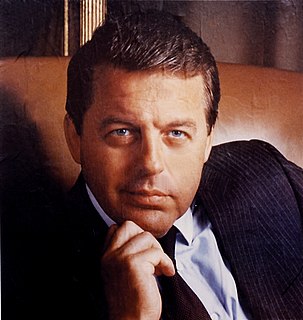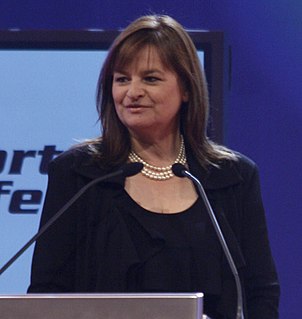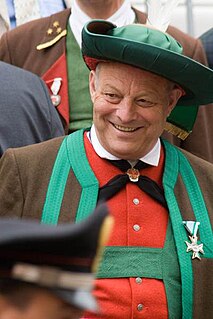
The politics of Austria take place in the framework of the federal parliamentary republic of Austria, with a President as head of state, and a Chancellor as the head of government. Governments, both local and federal, exercise executive power. Federal legislative power is vested both in the Federal Government and in the two chambers of Parliament; the National Council and the Federal Council. The Judiciary of Austria is independent of the executive and the legislature.

The Austrian People's Party is a conservative Christian-democratic political party in Austria. A successor to the Christian Social Party of the late 19th and early 20th centuries, it was founded immediately following the reestablishment of the Republic of Austria in 1945 and since then has been one of the two largest Austrian political parties with the Social Democratic Party of Austria (SPÖ). In federal governance, the ÖVP has spent most of the postwar era in a grand coalition with the SPÖ. Most recently, it has been junior partner in a coalition government with the SPÖ since 2007. However, the ÖVP won the 2017 election, having the greatest number of seats and formed a coalition with the far-right Freedom Party of Austria (FPÖ). Its chairman Sebastian Kurz is the youngest Chancellor in Austrian history.

Viktor Klima is an Austrian Social Democrat politician and businessman. He was chancellor of Austria from 1997 to 2000.

Franz Vranitzky is an Austrian politician. A member of the Social Democratic Party of Austria (SPÖ), he was Chancellor of Austria from 1986 to 1997.

Parliamentary elections were held in Austria on 3 October 1999.

Susanne Riess is a former Austrian politician of the Freedom Party of Austria (FPÖ).

The 2006 general election for the National Council in Austria was held on 1 October 2006.
Karin Gastinger is an Austrian politician. She was Federal Minister of Justice in the coalition government led by Wolfgang Schüssel which served from June 2004 to January 2007.

Snap legislative elections were held in Austria on 28 September 2008 to elect the 183 members of the National Council. The elections were caused by the withdrawal of the Austrian People's Party (ÖVP) from the governing grand coalition with the Social Democratic Party on 7 July 2008. Due to dissatisfaction with the grand coalition and the two main parties, it was widely expected to be a realigning election, with gains for the opposition and up to seven parties were expected to win seats.

The Carinthian state and municipal elections of 2009 were held in the Austrian state of Carinthia on 1 March 2009. Carinthia is the stronghold of the national conservative Alliance for the Future of Austria, whose founder Jörg Haider died in a car accident on 11 October 2008. He was also the incumbent governor; after his death, he was replaced by Gerhard Dörfler as governor, by Uwe Scheuch as Carinthian BZÖ leader and by his close personal friend Stefan Petzner as national BZÖ leader. The election is likely to see a strong contest between the SPÖ and the BZÖ over the post of governor, while the other Austrian parties play only a minor role in Carinthian politics.
The Freedom Party in Carinthia was a political party in Austria, operating in the federal state of Carinthia.
Thomas Prinzhorn is an Austrian industrialist and politician of the national liberal party Alliance for the Future of Austria (BZÖ).

Legislative elections were held in Austria on 29 September 2013.

The Social Democratic Party of Austria is a social-democratic political party in Austria that is, along with the People's Party, one of the country's two traditional major parties.
A legislative snap election for the National Council in Austria was held on 28 September 2008. The previous election was held on 1 October 2006. The election was caused by the withdrawal of Austrian People's Party leader Wilhelm Molterer from the governing grand coalition on 7 July 2008. Due to dissatisfaction with the grand coalition and the two main parties, it was widely expected to be a realigning election, with gains for the opposition and up to seven parties expected to be in the National Council after the election. The losses for the government parties resulted in strong gains for the far right, while neither the Liberal Forum nor the Citizens' Forum Austria gained as much as 2% of the vote, defying earlier expectations. The result of the election was seen as strong for the far-right and in support of Eurosceptics.
















